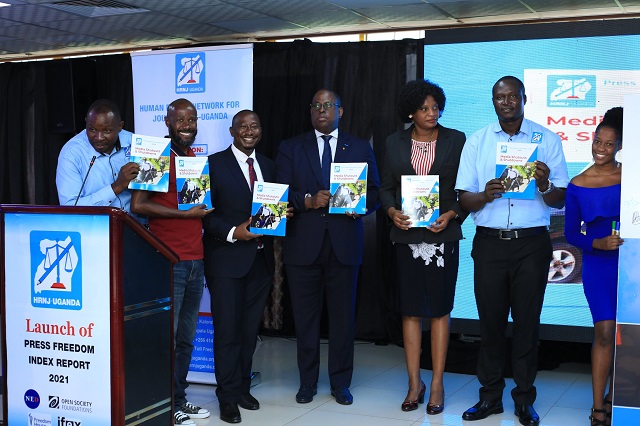
Kampala, Uganda | THE INDEPENDENT | Media practitioners are seeking practical solutions to improve press freedom in Uganda in the face of growing hostility against their work.
They argue that little or even no effort has been made to ensure that recommendations from the reports are put into action.
The issue was raised on Thursday during the release of the 2021 press freedom index by the Human Rights Network for Journalists-HRNJ.
Irene Abalo Otto, a journalist working with National Media Group-NMG, notes that although compiling reports about press freedom violations is good, it is high time for practical solutions.
“The reports are good because we want these matters documented, but we must do more than that,” Abalo noted.
Abalo, who walks on crutches after she was beaten by army officers in the course of her work, argues that in the last years there have been few efforts to push those responsible to work on the issue of press freedoms.
Dr. Ronald Rukare, a human rights expert and Chief of Party at Freedom House Uganda, notes that there should be a strong mechanism put in place to push practical results from the report like the implementation of recommendations and punishment of those violating media freedoms and rights.
According to the released report, HRNJ received and registered 131 cases involving human rights violation abuses against journalists and media practitioners in 2021. These include beatings, intimidation, cyber harassment, arbitrary arrests, detentions, torture, forceful confiscation of media equipment, and deletion of footage among others.
Like the previous years, the index shows that police remain the lead perpetrators of media rights followed by the army with a few cases perpetuated by Resident District Commissioners-RDC, Uganda Communication Commission- UCC, and members of the community.
Dr. Sylvia Namubiru, the Executive Director LASPNET says that as reports are produced, actors in the media sector should start carrying out analysis of the cases captured rather than just reading numbers. According to her, the desired remedy might be obtained after understanding the different incidents looking at the victims, perpetrators, and other actors involved.
Anna Merrifield, the deputy head of mission and head of the political, press, and information section of the European Union delegation, noted that the largest problem to media freedom in Uganda is impunity, especially by security officers and those in power.
“Let it be under no illusion- beating a journalist for merely doing his job is a criminal offense and there can never be any justification for it…In some of the recent discussions that I have been part of, there seems to be a debate about what impunity means. So let me be clear; as far as we are concerned, impunity means that people who commit crimes, or direct others to commit crimes, are not held to account and are not convicted and punished in line with the laws,” she says.
Joseph Beyanga, the Secretary-General of the Uganda National Association of Broadcasters (NAB) also notes that another possible way of reducing violations against journalists is professionalizing media houses so that each media house sets out ground rules for its journalists.
Robert Ssempala the HRNJ Executive Director says that there is a challenge in the implementation of the recommendations. He says that whenever the report is released, they have faced difficulties to meet institutions like the police, UCC, and judiciary.
Ssempala says that HRNJ is considering asking the international community to slap sanctions on the renowned violators of media freedoms and rights.
Although the nature of violations and abuses in 2021 had drastically decreased from those committed in the previous years, the report indicates that Uganda is still ranked among countries with widespread intimidation, harassment, and persecution of journalists.
Recently, the 2021 Global Press Freedom Index also indicated that Uganda’s record on freedom of expression, access to information, and the general media environment dropped from 117th in 2018 to remain static at 125th these past three years.
*****
URN
 The Independent Uganda: You get the Truth we Pay the Price
The Independent Uganda: You get the Truth we Pay the Price





